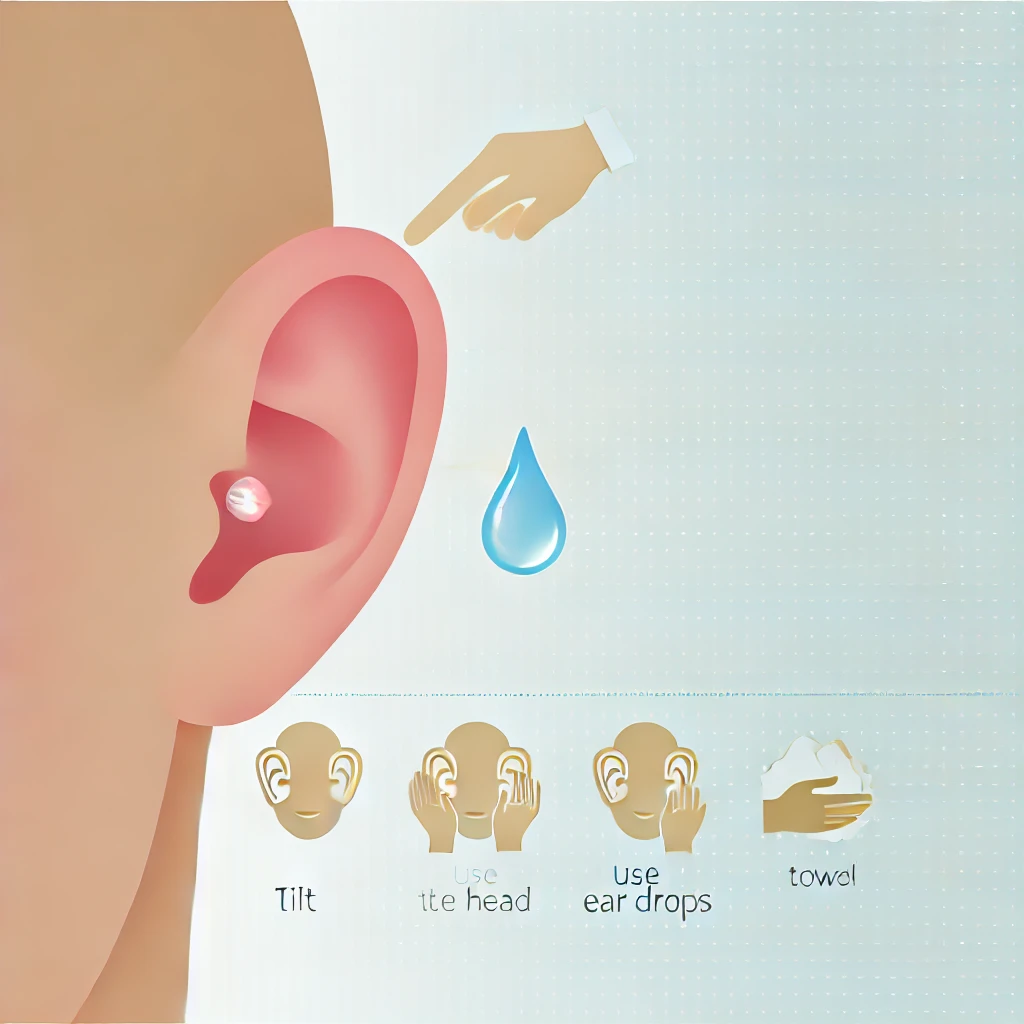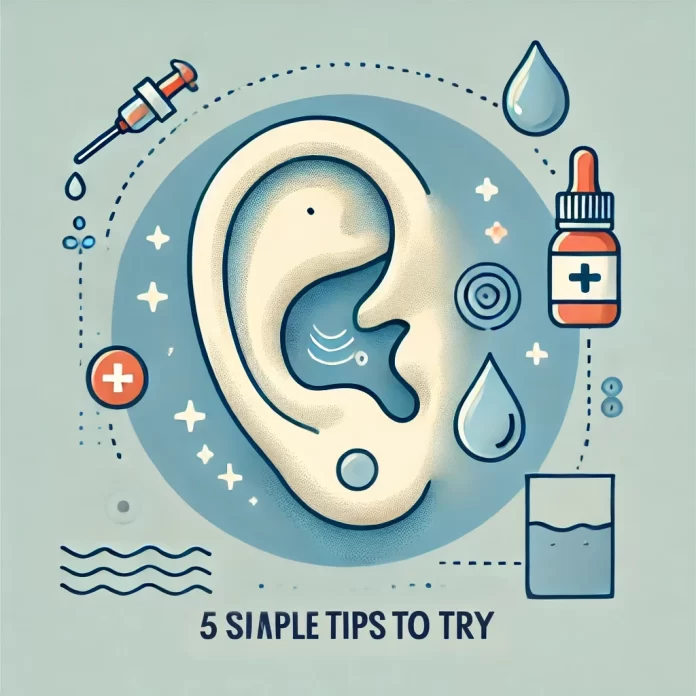Who hasn’t ever felt that irritating water remain in the ear after coming out of the pool or shower? You’re not alone! Water in the ear is something that people complain about from time to time, especially during swimming, and if not drained causes swelling and possible infection. In this article, we have given practical tips and tricks on safely clearing water from your ear. Any person in need of a solution for an issue known to offer a temporary headache or be audible could benefit from using this guide.
What Causes Water to Get Trapped in Your Ear?
It becomes quite easy for water to be trapped in your ear especially when swimming, bathing or even showering because of the structure of the outer ear. The ear canal is a brittle tube which connects the outer auricle with the Tympanic membrane. If the external canal of a human ear is inclined in such a way that the introduction of water into this canal may create a lock, the worst is expected.
Further, issues like too much earwax and inflammation can also lead to problems with water staying inside. This means when water gains access to the ear canal, then, it cannot drain out. It gives one a feeling of fullness or pressure, and this is quite uncomfortable. It is, therefore, important to understand what contributes to the water being trapped in the first place.
How Can You Tell If You Have Water in Your Ear?
In as much as water trapped in the ear is easily removed, it is a crucial first step to identify when this has occurred. Some signs are a full or stuffy feeling in the ear, decreased hearing, or even roaring noises. You might also have a little discomfort or even pain in your ears – a sign that water is stuck or there is inflammation.
If you suspect that you have water in your ear, you can perform a simple test: turn your head a bit sideways and try to pull the earlobe while rinsing to check if some water drops will begin to come out. Feeling a movement of liquids but cannot get the water out; then, it is high time to consider how to rinse safely.
Why Is It Important to Remove Water from Your Ear?
It is important to clear your ear from water for various reasons. First, trapped water causes discomfort and fullness that interferes with everyday life. Even more importantly, if water stays in the ear canal for an extended period, it encourages bacterial growth, which can lead to conditions such as swimmer’s ear or other types of ear conditions.
Moreover, the longer water stays trapped in the ear, the more irritated the thin skin will become in the ear canal thus worsening the situation and pulling more complications. Hence, responding immediately when you realize water is trapped in your ear is important.
What Are the Best Ways to Get Water Out of Your Ear?
Here are various ways of safely wiping out water from your ear. Here are some popular methods:
- Gravity Method: In this position, tilt the head to the right or to the left so that the head lies on the ear that feels congested all the way down. Take your fingers and twist the earlobe; when you do this, the water will drain out of the ear due to the force of gravity.
- Jaw Movements: It might be possible to shake the water out very slightly in the manner of chewing gum or even say ‘yawn’. They display this by either swallowing, tilting the head at the same angle as the fork, shaking the head left and right, and moving the mouth open and up and down as they say words.
- Using a Hair Dryer: You will need a hair dryer, and make sure to plug it into the wall outlet then, turn the knob as low as possible, then point the hair dryer as far away from your ear as you can. Another method using warm air is the enforced evaporation of water in the external auditory canal. Most importantly, avoid placing the dryer nearer so we can almost feel the heat, probably at arm’s length or even more.
- Over-the-Counter Ear Drops: Certain ear drops are made solely to remove water from the ear. These drops could be of help, especially if you sometimes experience water in your ears.
How Can You Prevent Water from Getting Stuck in Your Ear?
For this reason, it is useful to stop water from reaching the ears in the first place, and this piece seeks to explain how this can be done. Here are some tips to help you prevent water from entering your ear:
- Use Earplugs or Swim Caps: It is very highly recommended or discouraged to wear headphones or anything that will fit the ears when swimming and also wearing a swim cap cuts out another barrier where water cannot penetrate the ear drum.
- Tilt Your Head While Bathing: When washing with water, especially hair, the head must be positioned sideways so that the running water pours out from the ears and does not lock-in.
- Avoid Cotton Swabs: Syringing or using cotton swabs is learnt to be very risky because it may push the wax further down the canal than PSL. But if there is dirt outside the ear, then clean it, but be careful not to make it irritated with the cloth that you used just to clean the face or head; use a new piece of cloth.
What Should You Avoid When Trying to Remove Water?
While there are many effective methods for removing water from your ear, there are also several things you should avoid:
Inserting Objects: It is also advised never to attempt to put anything into the ear for(instance, cotton wool, fingers or other things). This may help push the pusher further and cause the most likely.
Using Alcohol or Vinegar Solutions: Other people advise that you fill the ear with alcohol or vinegar so that they can dry the ear, but this is very wrong since you only irritate the ear canal and, therefore, develop an infection.
Ignoring Symptoms: If you feel pain, have discharge, or are losing your ability to hear, do not overlook these signs of infection. Such symptoms may be symptomatic of an ear infection or some other condition that may need medical attention.
When Should You Seek Medical Help for Water Trapped in Your Ear?
Ear if the water stays in it for some time and you are in severe pain or have a loss of hearing or discharge from the affected ear, you should consult a doctor. Such symptoms may point toward ear infection or be a sign of other complications.
Besides, if water tends to remain in your ear often, it is advisable to seek medical advice since other conditions accompanied by ear wax blockage or congenital structures in your ear might be the cause.
Can Ear Drops Help Remove Water from Your Ear?
Therefore, it should not come as a surprise that you can use over-the-counter ear drops to help remove trapped water. These drops normally have properties that include absorbing moisture and preventing the onset of infections. If you always deal with water in your ear, it is wise to make ear drops a kitchen necessity.
When using ear drops, read the instructions on the side of the container carefully. Normally, you are supposed to bend your neck at an angle so as to let the dropper instil the drops in the affected ear. Then, you hold your head like that for some time before bending the neck in the opposite direction so as to let the drops, together with the trapped water, fall.
What Are Some Natural Remedies to Remove Water from Your Ear?
In addition to commercial ear drops, several natural remedies can help facilitate the removal of water from your ear:
- Warm Compress: Cleaning the ear and putting heat on the area can be very effective; it relieves pressure and cures the infection. Ensure the compress is warm, not hot, to avoid scolding the skin.
- Olive Oil or Mineral Oil: Warm olive oil or mineral oil, in some instances in droplets, can even be allowed to run in the ear due to its ability to reduce the ear canal wall’s weight, pulling out the trapped water.
- Vinegar and Rubbing Alcohol Mix: Equal volume vinegar and rubbing alcohol will evaporate water and can be useful against infections. Put a few drops into the ear, let it remain for several minutes and then turn your head to drain.

Key Takeaways: Tips to Safely Remove Water from Your Ear
- How to Properly Syringe Water From Your Ear Fluid can sometimes find its way into the ear, especially when you are swimming or even bathing, making it hard to do so as you feel a blockage.
- These are signs like fullness, muffled hearing, and a slight pain that must be noticed if the problem is to be solved.
- Effective ways to eliminate water include gravity techniques, jaw functions and ear drops that can be bought over the counter.
- Some ways to reduce the possibility of water becoming trapped include not using cotton swabs and earplugs.
- Consult a doctor if the water stays in the lungs for a long time or if your symptoms worsen.
By following these tips, you can effectively remove water from your ear and prevent potential complications. Remember, your ears are delicate, so always approach any issues with care and attention!
FAQ
Why does water gets stuck in my ear?
Oh man, it’s super common! Earwax is the sticky liquid that results from water that usually builds up in the ears, mostly after swimming or showering. The outer ear canal may catch some of that liquid, which, if you silly-bobbed your head at the right angle, will pour right into it. Well, it’s uncomfortable enough to have some water that can best be described as stuck in the ear canal, and the blocked ear feels full, which can be hardly comforting, can’t it?
How Many Ounces Are in a Gallon? Ultimate Conversion Guide
What are the signs that water is trapped in my ear?
This is especially true if you feel your ear is yelling at you or there is a weird pressure sensation. It is also possible to get slightly hard of hearing or think the ear is heavy. If it lasts too long, it has the potential to build up in the outer ear and create an ear infection—watch for that!
Can I really use gravity to drain water out?
You bet! One of the traditional stunts is to lower your head, giving the ill ear the direction of the fall. Shake it a little or hop, then rely on inertia. Sometimes, rubbing the earlobe also works…you’re simply using yourself as a tool to flush the water out of the ear.
Are there any safe ways to help the water come out?
Totally! You can try tilting or hopping in the dryer or even lying down on your side for some time. Another thing that you can do is yawn and force your ears to open by attempting to swallow with the mouth shut and the nose pinched gently. This can relieve pressure and may simply force that bothersome fluid to go away!
What about using ear swabs? Are they useful?
Hold up! Even though it must be quite compelling to take a few ear swabs to prod about, it is usually discouraged. It is embarrassing and painful, so you may use your fingers to shove the water even deeper into the ear canal. Also, you could injure your eardrum or your ear in general by screwing things up.
Trapped Water Issues
Trapped water in the ear is normally painful, and considering that most of folks get into touch with water after swimming , exposure to water and other related activities, water gets trapped inside your ear canal it is among the most frequent conditions people go through. Water in the ear canal can make you feel like your ear pain is full or may hurt your ear or cause an or even an outer ear infection. Some causes of trapped water in your ear include the structure of your ear and the earwax that may block the water drain channel. If the waterfall stays inside, it develops into bacterial growth in the ear, resulting in an infection in the outer ear, the swimmer’s ear. It is, therefore, important to allow water to drain since water in your middle ear may cause a series of complications. Do not place anything in the ear or pour more water into it because it will only go deeper into the ear canal and cause irritation. It is possible to free up water and clear water in the ear by using ear drops specifically meant for the process.
The Science of Fermentation: Unlocking the Secrets of Yeast and Food Processing
Keywords: tips to remove water ,get rid of water , water from your ear canal , water from your ear canal , lead to water getting , toward your ear , bacteria in the ear , help release water , natural drainage of water , time in the water , water from your middle ear , water from your middle ear , types of ear drops , absorb the water, deeper into your ear canal, may lead to an ear, gets trapped in the ear, water remains trapped , outside of the ear , opening of the ear , lead to an ear infection , excess water from your ears , ear and ear canal , ear is a common , affected ear facing , ear can lead , dry your ears , adding more water , suspect an ear infection , objects into your ear , affected ear facing downward , type of ear infection , called swimmer’s ear , called swimmer’s ear , ear feels blocked , help prevent water , drain from your ear , drain from your ear , water trapped inside , entering the ear canal


